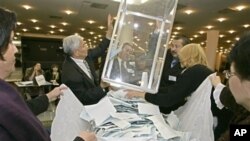The United States and Kazakhstan have developed a genuine and increasingly strategic partnership since Kazakhstan declared its independence from the Soviet Union 20 years ago. “From the very first days,” said Assistant Secretary at the Bureau of South and Central Asian Affairs Robert Blake, “our relations with Kazakhstan focused on integrating Kazakhstan into the world community and helping it to deal with the many challenges of a new nation.”
When Kazakhstan declared its independence, President Nursultan Nazarbayev set three goals for the new country: to build a truly sovereign and independent state, to jump start the economy, and to liberalize the political system.
Addressing the first goal, President Nazarbayev introduced a series of macro-economic reforms which, though painful at first, set the country firmly on the path toward a market economy. These reforms created what is today one of the strongest economies in the former Soviet Union.
With the recognition that economic success would rest on investments in education, particularly higher education, President Nazarbayer established the Bolashak international scholarship program which allows high-performing students from Kazakhstan to study overseas.
Progress on education and innovation allowed Kazakhstan to position itself as a leader in the international community, fulfilling the second goal by proving to be an influential, sovereign nation. Kazakhstan assumed leadership roles at the Organization for Security and Cooperation in Europe and the Organization of Islamic Cooperation.
It also took the lead in supporting the New Silk Road vision and other projects important to the future of Central Asia.
“But the third goal remains largely unmet, despite Kazakhstan’s stated commitments to reform and to uphold human rights and democratic principles,” said Assistant Secretary Blake.
“A more open and dynamic political system would reflect the maturity of the country, and provide the institutional basis for long-term stability, predictability, and development that the people of Kazakhstan deserve,” he added.
“President Nazarbayev has the opportunity today to demonstrate the same far sighted leadership to build democracy that he showed in renouncing nuclear weapons and initiating market reforms. The people of Kazakhstan will be the first beneficiaries, but Kazakhstan would also be a powerful example for the wider region.”
Two Down, One To Go In Kazakhstan

The United States and Kazakhstan have developed a genuine and increasingly strategic partnership.


















